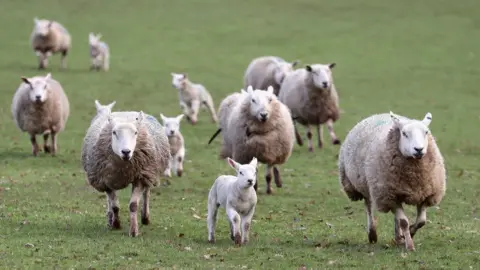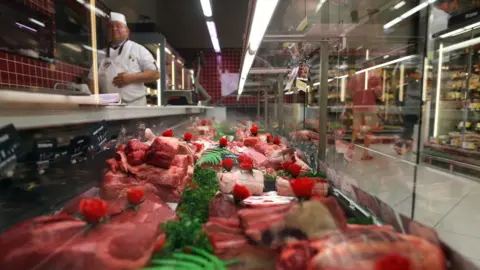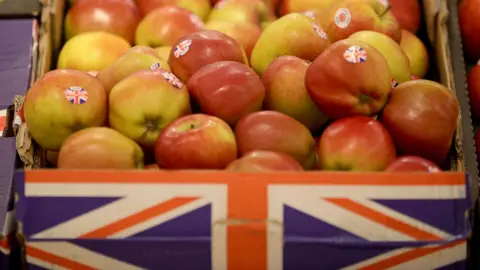MPs want Brexit fund for UK farmers
 Getty Images
Getty ImagesMPs scrutinising the government's plans for the agriculture industry after Brexit want funding for farmers when EU subsidies end, they said in a report.
Without an EU-UK trade deal, farm exports face tariffs from March 2019.
UK shoppers would also likely see price rises from EU imports such as Danish pork and French cheese, the MPs found.
However the Department for Environment, Food and Rural Affairs (Defra) said it could both "secure ambitious free trade deals while supporting farmers".
The environment secretary Michael Gove told farmers in January the government would guarantee subsidies at the current EU level only until the 2022 election.
The Environment, Food and Rural Affairs Committee assessed the impact of World Trade Organization (WTO) levels of tariffs and regulations being applied to UK-EU food trade, if no deal came out of Brexit negotiations.
It today published its report, Brexit: Trade in Food.
The report acknowledges the Government's intention to agree a comprehensive free trade agreement and customs agreement with the EU, but says "there is no guarantee that this will occur."
Newport West's Paul Flynn sits on the Commons' environment committee but opposes a recommendation in a report on how leaving the EU could impact the food trade.
The Labour MP said a special fund should not be set up to help, because in some cases it would be "income support for super rich".
WTO worries
"In the event that the UK leaves the EU without a free-trade agreement, UK-EU trade will proceed under WTO rules. Reverting to WTO tariffs will have a significant impact upon agriculture as tariffs are higher for agricultural products than for other goods and services," the report states.
UK exports would become less competitive in EU markets if WTO rules applied.
MPs on the committee suggested the switch from the single market to potential import and export tariffs on food between the UK and EU 27 could force the government to offer funding to farmers as they adjust.
The report says "Defra should consider providing a fund to support our food producing industry to adapt effectively to the challenge ahead."
The National Farmers Union (NFU) echoed the report's findings and its chief EU exit adviser Gail Soutar said there would be "significant impact on Britain's farmers and domestic food supply" if no deal was reached.
The committee said the sheep farming industry could in particular be worse-off if the EU slapped WTO tariffs on UK lamb.
The MPs on the committee heard "the EU is very important for UK sheep meat exports, with more than 95% of its export volume destined for the EU."
 Getty Images
Getty ImagesThe report said if sheep meat exports defaulted on to the usual tariff, which would increase their prices by 50%, they would become uncompetitive on the EU market.
Pain at the check-out
British shoppers would also see prices rise at the supermarket, if this import tax pushed up production costs for food made here or if the UK government slapped tariffs on food imports from the EU.
Helen Dickinson, chief executive of the British Retail Consortium said the committee's report highlighted the cost of a no-deal outcome for farmers, food producers and shoppers across the UK.
"If the UK leaves the EU with no trade agreement, the average WTO tariff of 22% that would be applied to imports, would increase prices for consumers... this would be an unappetising hit to their weekly food bills.
"Given that over two thirds of our food that is imported comes from the EU to supplement UK production, the scale of this potential impact is clear."
 Getty Images
Getty ImagesMs Dickinson said that the UK government should not simply cut all tariffs on imported food to help consumers out.
"The answer does not lie in unilaterally dropping tariffs to zero, due to the devastating consequences this would have for the UK's agricultural industry."
The committee's report said such a reaction would "put many UK farmers out of business and render the UK dependent on imported food".
The NFU also warned against the country lowering tariffs across the board, which would open the UK market up to more, potentially cheaper, food imports.
Golden opportunity
The industry is concerned cheaper imports will be available because of lower environmental and animal welfare standards in the countries they are produced - and that the UK's import rules may be softened in order to sign trade deals.
However a Defra spokesperson said: "Leaving the EU gives us a golden opportunity to secure ambitious free trade deals while supporting our farmers and producers to grow and sell more great British food.
"Any future [EU-UK] deal must work for UK farmers, businesses and consumers, and we will not compromise on our high environmental or welfare standards."
The agriculture industry employs one in eight people in the UK.
Farm and food production is worth around £110bn per year and the EU is both the largest recipient of British farm produce and the largest exporter of such goods into the UK.
